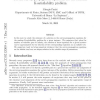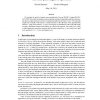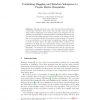1060 search results - page 15 / 212 » On the Discovery of Random Trees |
CORR
2002
Springer
14 years 11 months ago
2002
Springer
In this note we study the existence of a solution to the survey-propagation equations for the random K-satisfiability problem for a given instance. We conjecture that when the num...
FUN
2007
Springer
15 years 1 months ago
2007
Springer
This paper is devoted to the “Discovery of Slowness.” The archetypical perversely awful algorithm bogo-sort, which is sometimes referred to as Monkey-sort, is analyzed with ele...
117
click to vote
CAAP
1992
15 years 3 months ago
1992
We extend results about heights of random trees (Devroye, 1986, 1987, 1998b). In this paper, a general split tree model is considered in which the normalized subtree sizes of node...
135
click to vote
CORR
2011
Springer
14 years 6 months ago
2011
Springer
We consider the model of random trees introduced by Devroye [SIAM J Comput 28, 409– 432, 1998]. The model encompasses many important randomized algorithms and data structures. T...
IDA
2007
Springer
15 years 5 months ago
2007
Springer
Random forests are one of the best performing methods for constructing ensembles. They derive their strength from two aspects: using random subsamples of the training data (as in b...



